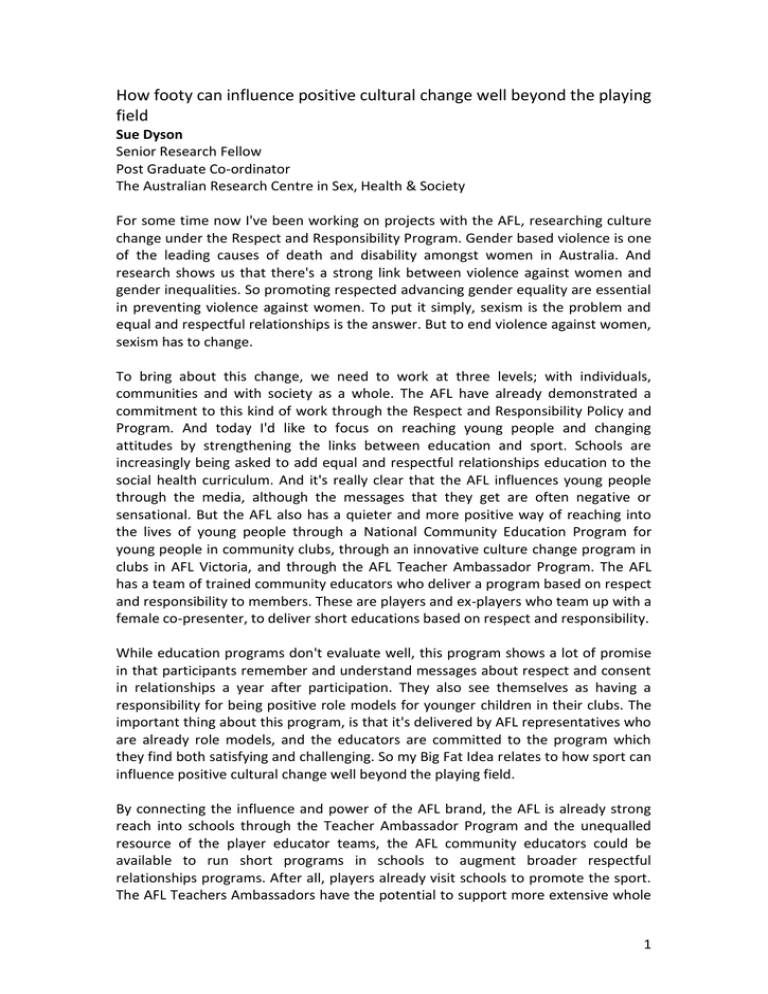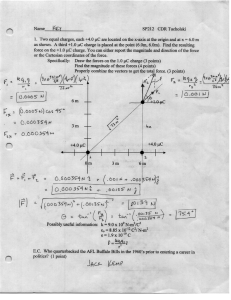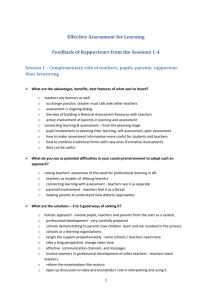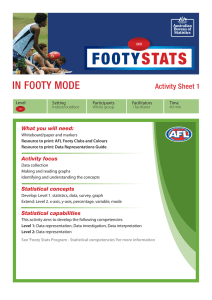How footy can influence positive cultural change well beyond the playing field Transcript
advertisement

How footy can influence positive cultural change well beyond the playing field Sue Dyson Senior Research Fellow Post Graduate Co-ordinator The Australian Research Centre in Sex, Health & Society For some time now I've been working on projects with the AFL, researching culture change under the Respect and Responsibility Program. Gender based violence is one of the leading causes of death and disability amongst women in Australia. And research shows us that there's a strong link between violence against women and gender inequalities. So promoting respected advancing gender equality are essential in preventing violence against women. To put it simply, sexism is the problem and equal and respectful relationships is the answer. But to end violence against women, sexism has to change. To bring about this change, we need to work at three levels; with individuals, communities and with society as a whole. The AFL have already demonstrated a commitment to this kind of work through the Respect and Responsibility Policy and Program. And today I'd like to focus on reaching young people and changing attitudes by strengthening the links between education and sport. Schools are increasingly being asked to add equal and respectful relationships education to the social health curriculum. And it's really clear that the AFL influences young people through the media, although the messages that they get are often negative or sensational. But the AFL also has a quieter and more positive way of reaching into the lives of young people through a National Community Education Program for young people in community clubs, through an innovative culture change program in clubs in AFL Victoria, and through the AFL Teacher Ambassador Program. The AFL has a team of trained community educators who deliver a program based on respect and responsibility to members. These are players and ex-players who team up with a female co-presenter, to deliver short educations based on respect and responsibility. While education programs don't evaluate well, this program shows a lot of promise in that participants remember and understand messages about respect and consent in relationships a year after participation. They also see themselves as having a responsibility for being positive role models for younger children in their clubs. The important thing about this program, is that it's delivered by AFL representatives who are already role models, and the educators are committed to the program which they find both satisfying and challenging. So my Big Fat Idea relates to how sport can influence positive cultural change well beyond the playing field. By connecting the influence and power of the AFL brand, the AFL is already strong reach into schools through the Teacher Ambassador Program and the unequalled resource of the player educator teams, the AFL community educators could be available to run short programs in schools to augment broader respectful relationships programs. After all, players already visit schools to promote the sport. The AFL Teachers Ambassadors have the potential to support more extensive whole 1 school programs and they could become ambassadors for promoting the values of respect and responsibility as well as ambassadors for the game. We know that young people respect their idols, regardless of whether they're positive or negative role models, so let's exploit the positive role models. The power of the AFL brand, its association with respect and responsibility and the influence of near peer community educators, on the attitudes and behaviours of the children they reach, has the potential to multiply the influence of the ordinary school programs for children of all ages. So that's my Big Fat Idea. End of recording 2




